
So you wanna play guitar, huh? Congratulations. It’s about damn time.
Just like every guitar player before you…
You’ve finally reached the point where just listening to your favorite songs is no longer enough…
Because you know deep down…the only thing that will make you truly happy in this world…
Is to actually start PLAYING those songs, with your own two hands…on a real guitar.
But, just like every wannabe air guitar player before you, there’s a good chance you feel intimidated and overwhelmed by:
- the absurdly large field of gear to choose from, and…
- the shameful lack of resources explaining the BIG PICTURE of this instrument
So for today, BIG PICTURE is exactly what you’ll get, with our crash-course on everything a beginner should know when getting started with the guitar.
First up…
Starting on Electric vs Acoustic Guitar
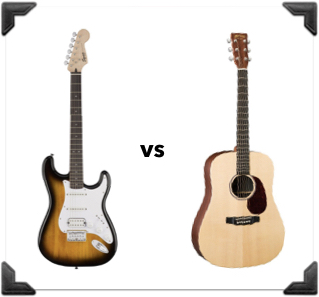
The very first question the every guitar newbie asks is:
Should I start on an acoustic or electric?
And while internet forums are filled with endless debates on this topic…the truth is that no single answer to this question is right for everyone.
Instead, the better approach is to simply ask yourself the following question: Who are my heroes?
Our heroes are the reason we all start playing guitar in the first place.
- So if your biggest heroes play electric guitar…Play that.
- And if they play acoustic guitar…Play that.
But what you should definitely NOT do, is try to learn both at the same time.
So then what if your favorite guitar player is Jimmy Page, or Eric Clapton? Or some other player who might be well known for his work on both instruments? What then? Or what if you just like a lot of different music in different genres?
Well in that case, let’s examine each option a bit more, shall we?
The Pros vs Cons of Starting on Acoustic Guitar
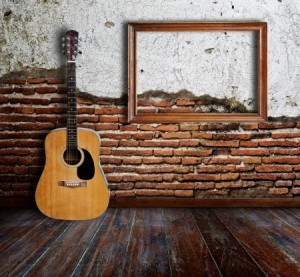
The biggest advantage of choosing the acoustic guitar is…
There are very few decisions you need to make in order to get started.
All you really need to do is:
- Choose a model in your price range
- Make sure it’s strung up and tuned
- Grab a pick (or not)
And you’re ready to start playing.
One common warning you’ll hear online as a reason to NOT start with acoustic guitar is that the strings are much stiffer, and harder to press down upon. And that is 100% true.
- Your fingers will start hurting quicker
- You won’t be able to practice as long
- And it will be MUCH harder to hold chords at first
But all 3 of these things are actually GOOD. And here’s why:
The Benefits of Building Finger Strength Early-On
Even though things will be harder in the beginning, you need to build up your calluses and finger strength eventually anyway, so you might as well get it out of the way ASAP.
And while it will be harder to hold chords…at first…it will force your hands to find a way to hold those chords in the most efficient way possible. Using the most leverage, with the least amount of effort.
Many people who start out on an electric, and then transition to acoustic, find that they are not even able to cleanly play a simple open chord.
When you start on acoustic, you’ll find the transition to electric to be much easier, because your hands are stronger, and you’ve already built some good technique.
The only exception here is if you’re a child. In which case, the acoustic strings may simply be too stiff for your hands. For anyone under 12 years old, definitely start out on an electric.
And one final argument as to why you should start on acoustic is that you will most likely develop a better ear, early on.
Because you get used to hearing the clean, unadulterated notes, without all the distractions of effects to mask things up.
To learn more about acoustic guitars, check out this article:
And now, for some counter-arguments…
The Pros vs Cons of Starting on Electric Guitar
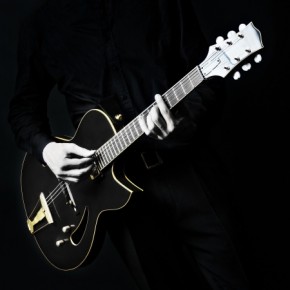
Unlike acoustic guitar, which is fairly simple to get started with…
With electric guitar, there’s a virtually endless number of gear and effects…that are as important to learn as the instrument itself.
The upside here is that your ears learn to be acutely aware of TONE, from the very beginning.
In contrast, acoustic guitar players may never really develop that same ear for tone, because it’s never within their control to actually change.
The main downside here is…all these effects can easily become a distraction that prevents you from actually learning how to play.
And that pretty much sums up all the pros and cons.
So all that’s left to do next is choose which option is right for you, and buy a guitar that fits your price range.
To learn more about electric guitars, check out this article:
Up next…
12 Accessories You’ll Eventually Need
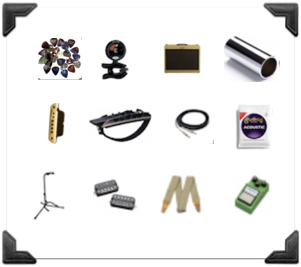
Once you’ve finally got a guitar…there’s a few more things you MAY still need…
Sometimes not for a few years, sometimes immediately, and sometimes not at all…
Depending on whether you play acoustic or electric, and a number of other factors as well.
So here are those items:
- Straps
- Strings
- Tuners
- Cables
- Amps
- Pedals
- Stands
- Picks
- Capos
- Slides
- Pickups
So let’s now look at each of these in more detail. Starting with…
1. Guitar Straps
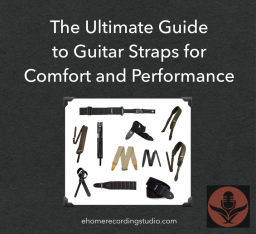
To play any guitar standing up, you’ll obviously need a strap to hold your guitar in place.
Depending on the guitar you bought, it may or may not have come with one.
If you do have one, just use that, and start practicing.
If however you don’t have one yet, or want to upgrade one later in the future, check out this post for more info on finding the perfect one:
Up next…
2. Guitar Strings
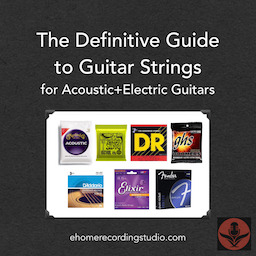
For both electric and acoustic guitar, the next accessory to worry about is strings.
Initially, you can almost guarantee that your guitar will come strung-up with a brand new set of strings.
And if you bought it at your local guitar shop, they’ll even tune it for you.
However…a common beginner mistake is assuming those strings will stay perfectly fresh and tuned forever. And they won’t.
The lucky guys break their first string quickly, and are forced to figure out how to find a new pair and restring their guitar on their own.
The unlucky guys play that first set of strings for WAY too long, and don’t discover that they need new ones until a more experienced player sees the condition of those strings…and probably calls him an idiot.
A good rule of thumb is: if you play for an hour a day, you’ll want to change your strings anywhere from every few weeks to every few months.
However, rather than following this general rule blindly, I highly suggest learning everything you can about guitar strings in general. In which case, I have the perfect post for you:
Up next…
3. Guitar Tuners
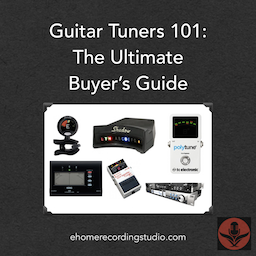
Once you’ve got a brand new set of strings on your brand new guitar, the next step is tuning it so you can actually play.
But as you will eventually discover after many years of playing…
Competent guitar tuning is an art form in itself…that needs to be practiced and refined over a long period of time.
So in the beginning, when you first start playing, and your ears can’t tell one note from another, guitar tuners are a MUST-HAVE because they are the only practical way to accurately get in-tune.
And even years later, when you’ve refined your ears to the point where don’t really NEED a guitar tuner anymore…they’re still useful on occasions when you just prefer to use them out of laziness.
For help finding a guitar tuner, check out this article:
Up next…
4. Guitar Cables
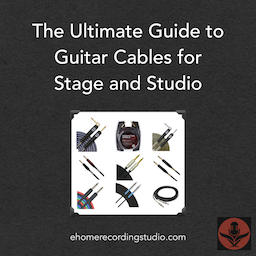
Assuming you’ve chosen to play electric guitar…the next thing you’ll need is a guitar cable to plug your guitar into your amp.
For your first guitar cable, it really doesn’t matter too much which one you get…
So don’t spend too much time on it. Especially since a half decent cable can be bought for around 20 bucks.
However later, as you get more advanced, you will definitely want to get a cable more specific to what you actually need and can afford.
And so to learn more on this subject, check out the following post:
Up next…
5. Guitar Amps
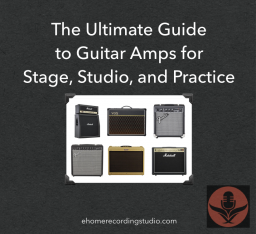
Among the electric guitar accesories on this list, the guitar amp is by far the MOST important of all.
In fact, one could argue that it is even more important than the guitar itself.
Because the fact is, virtually any guitar, combined with virtually any combination of pedals and other effects…
IF filtered through a shitty amp…Is pretty much guaranteed to sound shitty.
On the other hand, a cheap guitar, played through ZERO effects, still has the potential to sound awesome if played through an awesome amp.
And while a big high-end amp isn’t really practical for beginners…you still want to find a suitable compromise that allows your other gear to perform up to their full potential.
To find out more about guitar amps in general, and see what I recommend…check out this post:
Up next…
6. Guitar Stands
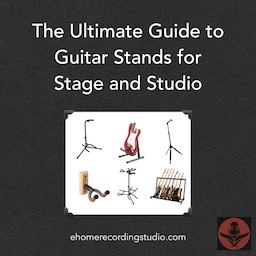
To be honest…a guitar stand really isn’t a “must-have” as you first start playing
In fact, many players never buy one at all.
If your guitar came with a case, which it almost certainly did, and you only play at home…
Why on Earth would you need a guitar stand?
Well my personal philosophy is: every beginner needs a guitar stand, from day 1. And here’s why:
The most common reason newbies quit learning to play guitar is: they simply forget that they have one.
Sounds ridiculous I know…but we all have busy lives, and when our guitars are stowed away in their cases in the back of our closets, it’s easy to forget they’re even there.
But when it’s sitting on that stand in the middle of your living room…every time you look it, it practically speaks to you, and says…Play me.
So even though you may not technically NEED one, for this reason, I highly suggest getting one anyway. And for help with that, check out this article:
Up next…
7. Picks
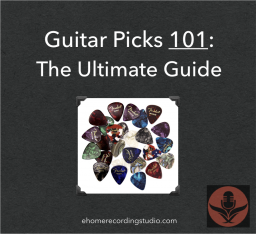
When you first start playing, and EVERYTHING feels uncomfortable…
It’s nearly impossible to tell the difference between one pick and another.
Or whether or not you want to even use a pick at all.
So for the most part, there’s really no wrong answer with picks, at least in the beginning.
But as your playing improves, and you start to develop your own style and tendencies…the differences between one pick and another become more apparent.
And certain pick gauges and materials may suit your playing style better than others.
To learn more about the different pick options are and how they compare, check out this post:
Up next…
8. Capos
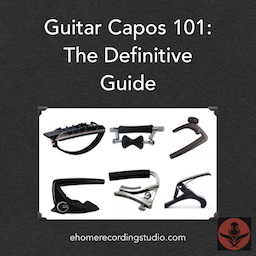
If you’re just getting started with guitar…there’s probably a 50/50 chance you’ve seen a guitar capo before.
And there’s a nearly 99% chance you have no clue what they do or why you might need one.
And the truth is…until you know exactly why YOU need one…you really don’t need one.
But to satisfy your curiosity, the short answer is that it allows you to change the key of the song quickly, without having to retune your strings.
If you’re curious, and want to learn more about them right now, check out this post:
Up next…
9. Guitar Pedals
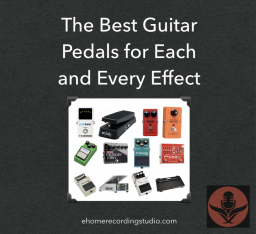
As the most addicting of all guitar accessories, pedals are one of things that you always want just one more of…
No matter how many you already have, or how long you’ve been playing.
And that’s mainly because, they’re just really fun to play around with.
In a more practical sense, they are arguably the one element in your setup that is most important in molding and defining “your signature sound”.
And so, some players go through tremendous lengths to mix and match virtually every combination of pedals imaginable, all in the quest for the ultimate tone.
However…for players just getting started, choosing you very first pedals can seem quite overwhelming, especially if you don’t know the first thing about effects yet.
And so in the following post, I explain each of the most popular effects and recommend several of the most popular pedals on the market in each category:
Up next…
10. Slides
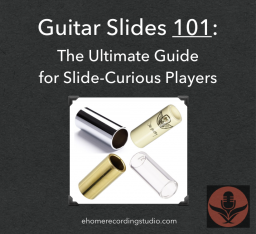
With 99% of new guitar players…slides are a non-issue.
They either don’t care about learning to play slide, or they very likely don’t even know what it is.
However…since you’ve made it this far in the post, I might as well cover it now…
Because at SOME point in virtually every player’s career, slide playing becomes the coolest thing ever, even if it’s only a momentary fascination.
And if it fascinates you right now, or you’re just curious to learn more about slide playing in general…
I highly recommend checking out the following post, where I explain the different types of slides, and give my top recommendations in each category:
Up next…
11. Pickups
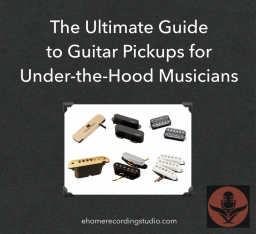
Among the list of essential guitar accessories…pickups rank pretty damn low.
Many players go their entire lives without ever once thinking about switching their current pickups for something different.
Mostly because…the mere thought of opening up your precious guitar and gutting it can feel quite unpleasant if you’ve never done it before.
However…for the brave few that are willing to experiment with this aspect of their sound…
Custom pickups can actually do quite a bit to help you mold your tone in ways you never imagined.
And so…if you’re just curious to see what your future might one day hold…check out this post to learn more:
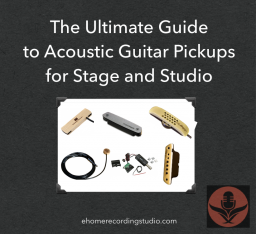
In contrast to electric pickups…acoustic pickups are one of those accessories that almost all players must explore at some point.
Because if you ever plan on playing in front of more than a few people at a time…
The acoustic guitar is going to need SOME type of amplification…and acoustic pickups are the only practical solution to this problem.
While some acoustic guitars come assembled with pre-built electronics…
In most cases, they DON’T, and it’s something you’ll have to add on your own when the time comes.
So to learn more on this topic, check out this post:
By the way, if you found this post useful, I highly recommend joining our free Home Recording Secrets email newsletter where you’ll discover….
- How to Get Your First Studio Up and Running in a Single Weekend
- How to Avoid Wasting Thousands of Dollars on Unnecessary Pointless Purchases
- How to Get a “Million Dollar” Pro Studio Sound in a “Thousand Dollar” Home Studio
- PLUS… All Sorts of Other Amazing Insider Secrets Revealed
And it’s totally FREE! Click here and Enter Your Email to Sign Up.
More Guitar Posts in This Series:
Electric Guitar | Acoustic Guitar | Bass Guitar | Amps | Pedals | Cables | Pickups | Bass Strings | Bass Amps | Bass Pickups | Classical Guitars | Acoustic Pickups | Direct Boxes | Cases | Picks | Slides | Straps | Tuners | Stands | Strings | Capos | Tabs | Guitar Accessories